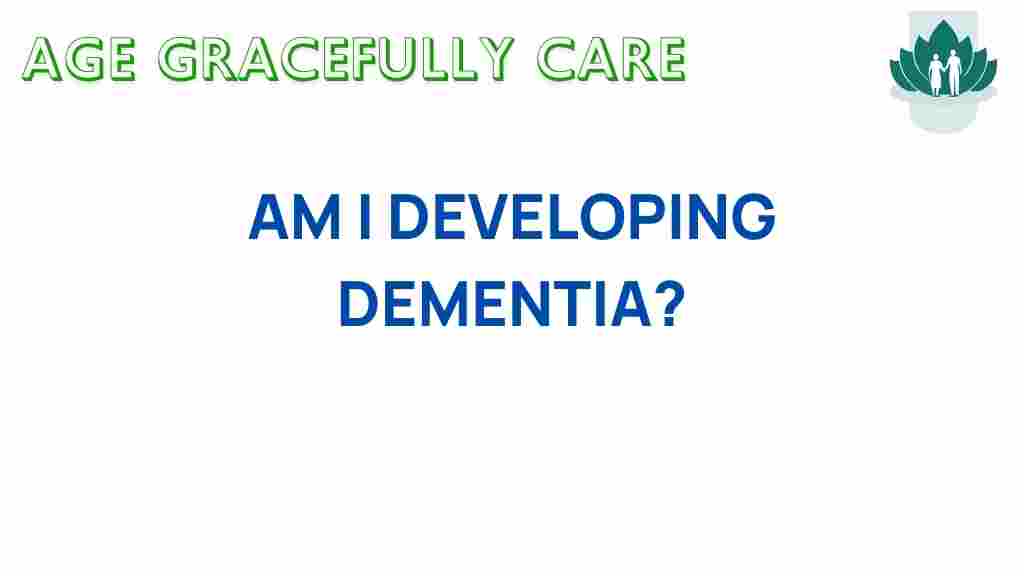Unraveling the Signs: Am I Developing Dementia?
Dementia is a term that encompasses a range of neurological disorders, including Alzheimer’s disease, which lead to cognitive decline and memory loss. As we age, the risk of developing such conditions increases, making it crucial to recognize the early symptoms of dementia. In this article, we will explore the signs, causes, and steps you can take to maintain your brain health and mental wellness as you age.
Understanding Dementia and Its Early Symptoms
Dementia is not a single disease but a general term that describes a decline in cognitive function severe enough to interfere with daily life. It primarily affects memory, thinking, and social abilities. The early symptoms of dementia can be subtle and may vary from person to person. Here are some common early signs:
- Memory Loss: Forgetting recently learned information or important dates.
- Difficulty Performing Familiar Tasks: Struggling to complete routine tasks or forgetting how to use common household items.
- Language Problems: Trouble finding the right words or following conversations.
- Disorientation: Becoming confused about time or place.
- Changes in Mood and Personality: Experiencing mood swings, anxiety, or depression.
Recognizing these early symptoms is vital for seeking timely medical intervention and support.
Causes of Cognitive Decline and Dementia
The causes of dementia can vary widely, and understanding them can help in managing brain health. Some of the key factors include:
- Aging: The greatest risk factor for dementia is age. As we grow older, the likelihood of developing neurological disorders increases.
- Genetics: Family history can play a significant role in your risk for Alzheimer’s and other forms of dementia.
- Medical Conditions: Conditions such as high blood pressure, diabetes, and heart disease can contribute to cognitive decline.
- Lifestyle Factors: Poor diet, lack of physical activity, and smoking can negatively impact brain health.
Steps to Maintain Brain Health and Prevent Dementia
While some risk factors for dementia are beyond our control, there are proactive steps we can take to support cognitive health:
- Stay Mentally Active: Engage in activities that stimulate your brain, such as puzzles, reading, or learning a new skill.
- Physical Exercise: Regular physical activity helps improve blood flow to the brain and can reduce the risk of cognitive decline.
- Healthy Diet: A balanced diet rich in fruits, vegetables, whole grains, and lean proteins supports overall brain health.
- Social Engagement: Maintain social connections and participate in community activities to promote mental wellness.
- Regular Check-Ups: Monitor your health with regular medical check-ups to catch any potential issues early.
Diagnosing Dementia: What to Expect
If you or a loved one is experiencing symptoms of cognitive decline, it is essential to seek a professional evaluation. The diagnostic process typically includes:
- Medical History Review: Your doctor will ask about your medical history and any family history of dementia.
- Cognitive Tests: Various tests will assess your memory, problem-solving skills, and other cognitive abilities.
- Physical Exam: A physical examination helps rule out other possible causes of symptoms.
- Brain Imaging: Imaging tests like MRI or CT scans may be ordered to detect any changes in the brain.
Once diagnosed, discussing treatment options with your healthcare provider is crucial to managing symptoms and maintaining quality of life.
Troubleshooting Tips for Early Symptoms of Dementia
If you notice early symptoms of dementia in yourself or someone else, consider these troubleshooting tips:
- Document Symptoms: Keep a journal of symptoms, noting when they occur and under what circumstances.
- Stay Organized: Use calendars and reminders to help manage daily tasks and appointments.
- Limit Distractions: Create a calm environment to improve focus during conversations or tasks.
- Establish Routines: Consistent daily routines can help reduce confusion and anxiety.
- Seek Support: Don’t hesitate to reach out to friends, family, or support groups for emotional assistance.
The Importance of Mental Wellness
Mental wellness plays a crucial role in cognitive health. Stress management techniques such as meditation, yoga, and deep breathing can be beneficial. Furthermore, maintaining a positive outlook and engaging in enjoyable activities can enhance overall well-being.
When to Seek Professional Help
It’s essential to consult a healthcare professional if you or someone you know is experiencing significant memory loss or other cognitive issues. Early intervention can make a considerable difference in managing dementia and improving quality of life. Remember, you are not alone, and there are resources available to help.
For more information on dementia and its management, you can visit the Alzheimer’s Association website.
Conclusion
Understanding dementia and its early symptoms is vital in addressing cognitive decline effectively. By recognizing the signs, maintaining a healthy lifestyle, and seeking professional help when necessary, you can support your brain health and mental wellness as you age. Remember, it’s never too late to make positive changes that can enhance your quality of life and cognitive function.
For further reading on mental wellness and brain health, check out our article on strategies for improving cognitive function.
This article is in the category Health and created by AgeGracefullyCare Team
